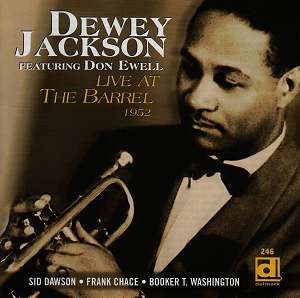1. That’s a Plenty
2. Bucket’s Got a Hole In It
3. Bugle Call Rag
4. St James Infirmary
5. Tiger Rag
6. Tishomingo
7. High Society
8. Maple Leaf Rag
9. When the Saints Go Marching In
10. Royal Garden Blues
Dewey Jackson – Trumpet
Frank Chace – Clarinet
Sid Dawson – Trombone
Don Ewell – Piano
Booker T. Washington - Drums
Just
as there are "primitives" in the
art world (Henri Rousseau being a renowned
example), there are primitives in jazz, especially
in New Orleans and traditional jazz. The first
track of this CD bursts upon your ears like
a whirlwind of unbridled sounds – wild trumpet,
wailing clarinet, thumping trombone and drums.
The band is like a force of nature: sweeping
all before it and seemingly unstoppable.
This
recording was actually made by the Delmark
company’s own Bob Koester at the Barrel club
in St Louis – on Delmar Avenue (whence came
the name of the Delmark label). Koester made
the recording with a borrowed microphone and
tape recorder - and the quality is remarkably
good in the circumstances, although the enthusiastic
audience is occasionally in danger of drowning
out the band. Some tracks – like Bugle
Call Rag - lose their beginnings and
endings.
Dewey
Jackson (1900-1966) is not very well known,
although he played for pianist Fate Marable
(who famously employed Louis Armstrong) and
was in the first Cotton Club orchestra in
New York. He didn’t stay in New York but returned
to St Louis, which he found more exciting.
Certainly the music on this disc is compelling.
It may lack precision and subtlety but it
conjures up the sort of vigour that one associates
with the early pioneering days of jazz.
Many
tracks are fast and furious, including a riotous
Tiger Rag and a High Society
in which Frank Chace makes a brave attempt
at the classic solo. Chace’s rather strangled
clarinet sound is reminiscent of Pee Wee Russell.
His solo on That’s a Plenty sounds
like a writhing snake. On the same track,
Dewey Jackson maintains an impressively long-held
note, while Booker T. Washington adds a muscular
drum solo. St James Infirmary is delivered
with the right sort of doomy atmosphere, with
Dewey Jackson lamenting poignantly. His trumpet
is authoritative on Tishomingo and
he inserts some cheeky quotations (including
Love in Bloom and The Old Folks
at Home) into the Saints. Here
and elsewhere, his growling style reminds
me at times of Henry "Red" Allen.
The
best-known musician on the album is probably
pianist Don Ewell, whose educated playing
is featured in Maple Leaf Rag and who
makes valuable contributions to several other
tracks, as well as providing well-judged accompaniments
as part of the two-man rhythm team. With only
five musicians, this band packs an incredible
punch!
Tony Augarde
